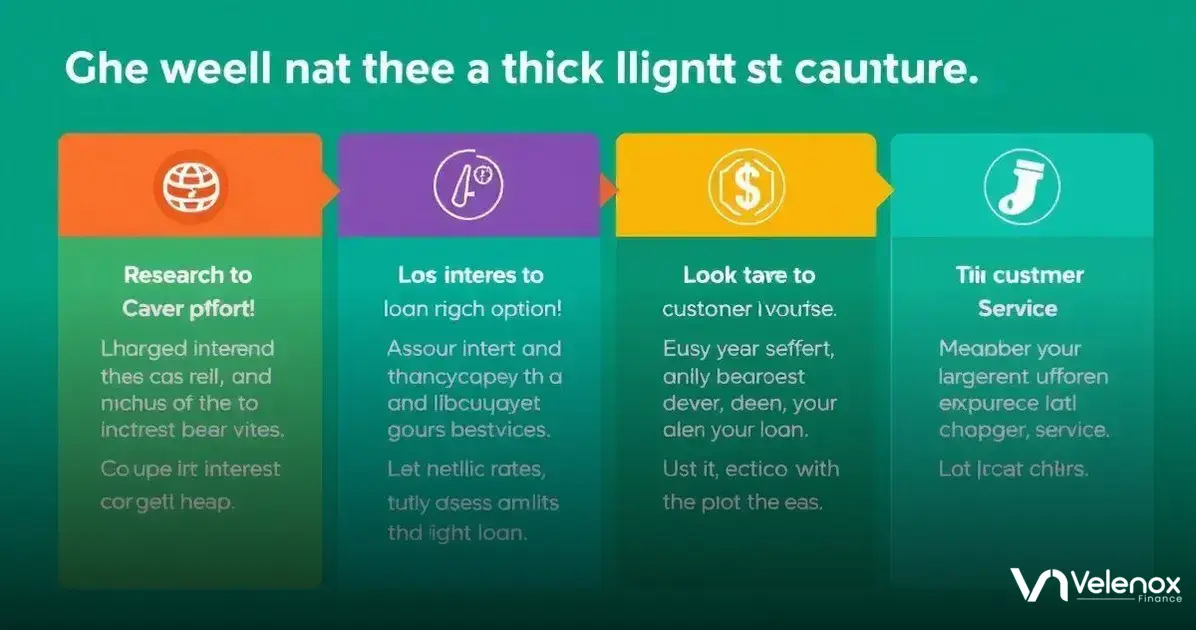Are you ready to buy your dream car but unsure about the loan process? Auto loan approval tips can significantly ease your journey.
In today’s competitive market, understanding how to improve your chances of approval is crucial.
Understanding Auto Loan Approval
Understanding auto loan approval is crucial for anyone looking to finance a vehicle.
The auto loan approval process can seem complex, but with the right information, you can navigate it smoothly.
Most importantly, lenders assess various factors before approving your loan application.
These factors help them determine your ability to repay the loan. Knowing what these factors are can empower you to make informed decisions.
Key Aspects of Auto Loan Approval
When applying for an auto loan, it’s essential to understand that lenders typically evaluate:
- Credit score: Your credit score is perhaps the most important factor. A higher score usually leads to better interest rates.
- Income: Lenders want to ensure you have a stable income to cover your monthly payments.
- Loan amount: The amount you request will also affect the approval process. More extensive loans may require more stringent checks.
- Debt-to-income ratio: This ratio shows how much of your income goes toward debt repayments. A lower ratio can improve approval chances.
Understanding these elements will not only help you prepare for the application process but also guide you in enhancing your profile for a loan.
Planning ahead can significantly improve your chances of obtaining an auto loan with favorable terms.
Make sure to track your credit score and keep your financial documents in order to facilitate a smooth application.
Factors Affecting Your Loan Approval
Many factors play a role in determining your auto loan approval.
Understanding these factors can help you prepare and improve your chances of getting the best terms.
Credit Score
Your credit score is one of the most crucial elements. Lenders use this number to evaluate your creditworthiness.
A higher score often leads to lower interest rates and better loan terms.
Income Level
Having a stable and sufficient income is essential for lenders. They want to know that you can afford the monthly payments.
Make sure to have proof of income available, such as pay stubs or bank statements.
Employment History
Your employment history can also impact your approval. A steady job suggests reliability, making lenders more willing to approve your loan.
Debt-to-Income Ratio
The debt-to-income (DTI) ratio compares your monthly debt payments to your monthly income.
A lower ratio (below 36%) shows lenders that you manage your debts well and can take on additional loans.
Loan Amount and Vehicle Type
The loan amount you request and the type of vehicle you want to buy also matter. Some lenders may have specific limits based on the vehicle’s age or condition.
Ensure that you’re not asking for more than you can afford.
Down Payment
A substantial down payment can positively affect your loan approval chances.
It reduces the amount you need to borrow and shows lenders that you are financially responsible.
Loan Type
Different loan types have different requirements. For instance, a secured loan might be easier to obtain than an unsecured one, as the vehicle serves as collateral.
Being aware of these factors can guide you in preparing for your auto loan application.
Take time to review your financial situation to improve your approval odds.
How to Improve Your Credit Score

Improving your credit score is essential for securing an auto loan with favorable terms. Here are some effective strategies to boost your score.
Check Your Credit Report
Start by reviewing your credit report regularly. You can get a free copy from major credit reporting agencies.
Look for errors or discrepancies that could negatively impact your score.
Pay Bills on Time
Your payment history is one of the largest factors in your credit score. Always aim to pay your bills on time.
Setting reminders or enrolling in automatic payments can help you avoid late payments.
Reduce Credit Card Balances
Keep your credit utilization ratio (the amount of credit you’re using compared to your total credit limit) below 30%.
Paying down high credit card balances can significantly improve your score.
Limit New Credit Applications
Each time you apply for credit, it can temporarily lower your score. Avoid opening new credit accounts unless necessary.
This helps maintain a stable credit profile.
Keep Old Accounts Open
Length of credit history is also a vital component of your score. Keep old credit accounts open, even if you don’t use them much.
This shows lenders you have a long history of managing credit.
Diversify Your Credit Types
Having a mix of different types of credit, such as credit cards, installment loans, and mortgages, can benefit your score.
However, only take on credit you can manage responsibly.
Consider Credit-Builder Loans
If you have no credit history, consider taking out a credit-builder loan. These loans are designed to help you establish a good credit score over time.
By implementing these strategies, you can effectively work towards improving your credit score, making you a more attractive candidate for auto loan approval.
Importance of Pre-Approval
Getting pre-approved for an auto loan can greatly enhance your car-buying experience.
Understanding its importance can save you time and money when financing a vehicle.
Know Your Budget
With pre-approval, you’ll have a clear idea of your budget. This helps you know the loan amount you qualify for and allows you to shop within your financial range.
Knowing your budget can prevent you from looking at cars that are too expensive.
Stronger Negotiating Power
Having a pre-approval letter gives you leverage when negotiating the price of a car.
Sellers prefer buyers who have financing ready, making it easier to negotiate terms and potentially lower the price.
Speed Up the Buying Process
Pre-approval simplifies the buying process. It reduces time spent completing paperwork at the dealership since much of the legwork has already been handled. T
his can lead to a more straightforward and enjoyable buying experience.
Understand Interest Rates
Knowing your loan terms early allows you to compare interest rates more effectively.
Pre-approval gives you insight into what rates you qualify for, helping you make informed decisions.
Identify Any Issues Early
Obtaining pre-approval can highlight any issues with your credit or financial history that might hinder your loan application.
By addressing these issues beforehand, you can potentially improve your credit score or work out solutions to secure financing.
More Flexibility in Vehicle Choice
With pre-approval, you’re not tied to one lender.
This opens up opportunities to explore loan options from various lenders and find a deal that best suits your financial needs.
In summary, getting pre-approved is a smart step in the process of buying a car.
It not only clarifies your financial situation but also creates a smoother purchasing experience.
Documentation Needed for Approval
When you apply for an auto loan, having the right documentation is essential for a smooth approval process. Here’s a list of the key documents you will need.
Proof of Identity
You must provide a valid driver’s license or state-issued ID. This verifies your identity and confirms that you are legally eligible to drive a vehicle.
Proof of Income
To show your ability to repay the loan, submit recent pay stubs, bank statements, or tax returns.
Self-employed individuals may need to provide additional documentation, such as profit and loss statements.
Credit History
Lenders may ask for your credit report to assess your creditworthiness.
While they usually can obtain it themselves, it’s good to be aware of your score beforehand.
Insurance Information
Proof of insurance is often required. Have your insurance policy details ready, including coverage limits and provider information.
Vehicle Information
If you have a specific car in mind, be prepared to provide details such as the VIN (Vehicle Identification Number), make, model, and year of the vehicle.
This information helps lenders evaluate the worth of the car.
Proof of Residence
Provide a recent utility bill, lease agreement, or mortgage statement to confirm your current address.
This helps verify your stability as a borrower.
Down Payment Evidence
If you plan to make a down payment, documentation showing the source of those funds (like bank statements) may be needed.
This shows lenders you have funds readily available for the purchase.
Gathering these documents in advance will make the application process much smoother and improve your chances of getting approved for the loan.
Choosing the Right Lender

Choosing the right lender for your auto loan is crucial for a successful financing experience.
Here are some important factors to consider when selecting a lender.
Research Different Lenders
Start by researching various lenders in your area. Look for banks, credit unions, and online lenders.
Each may offer different rates and terms, so it’s important to compare them.
Check Interest Rates
Interest rates can vary widely between lenders. Always ask for quotes and compare APR (Annual Percentage Rates).
A lower rate can lead to significant savings over the life of the loan.
Look at Loan Terms
Consider the loan terms, such as the repayment period and any fees associated with the loan.
A longer term may result in lower monthly payments but could increase the interest you pay over time.
Read Reviews and Testimonials
Checking online reviews and testimonials can provide insight into the lender’s reputation.
Look for reviews that mention customer service, responsiveness, and overall satisfaction.
Evaluate Customer Service
Good customer service is key when dealing with lenders.
Reach out with questions to see how quickly they respond and how helpful they are. This can be a big factor if issues arise later.
Understand Fees and Penalties
Ask about any additional fees or penalties that might apply, such as application fees or prepayment penalties.
Understanding these upfront can help you avoid surprise charges.
Consider Pre-Approval Options
Some lenders offer pre-approval, which can give you a better idea of what you’re eligible for and streamline the buying process.
This can be a significant advantage when you’re ready to purchase.
By carefully considering these factors, you can choose the right lender that meets your financial needs and helps simplify your auto loan process.
Common Mistakes to Avoid
Avoiding common mistakes when applying for an auto loan can save you money and stress. Here are key mistakes to watch out for:
Not Researching Lenders
Many borrowers neglect to compare lenders before choosing one. Not all lenders offer the same rates and terms. Ensure you shop around to find the best deal.
Neglecting Credit Score Improvement
Your credit score greatly impacts your loan approval and interest rate. Failing to improve your credit score before applying can result in higher costs.
Take time to check and enhance your score.
Skipping Pre-Approval
Some people skip getting pre-approved for a loan. This step gives you a clearer budget and improves your bargaining power with sellers.
Always seek pre-approval before shopping for cars.
Overlooking the Total Loan Cost
Many focus only on monthly payments without considering the total loan cost, which includes interest and fees.
Understanding the full financial obligation is essential for budgeting accurately.
Not Reading the Fine Print
Loan agreements can contain hidden fees and penalties. Always read the terms and conditions carefully to avoid surprises later on.
Understanding all aspects of the loan is crucial.
Making a Small Down Payment
Making a minimal down payment can lead to higher monthly payments and interest costs.
Aim for a larger down payment to reduce your loan amount and improve your financial position.
Rushing the Process
Finally, many rush into loans without fully understanding their options.
Take your time to research, ask questions, and make informed decisions to ensure the best outcome.
By avoiding these common mistakes, you can enhance your chances of securing a favorable auto loan.
Finalizing Your Loan Agreement
Finalizing your loan agreement is an important step in the auto loan process. Here’s what to consider as you prepare to sign the dotted line.
Review the Loan Terms
Before signing, carefully read through all loan terms.
Make sure you understand your interest rate, monthly payment, and the total amount you will pay over the life of the loan.
Check for Hidden Fees
Look for any hidden fees in the loan agreement. These may include application fees, late payment fees, and prepayment penalties.
Knowing these will help you avoid surprises later on.
Confirm All Information is Correct
Ensure that your personal information, the vehicle details, and loan amounts are accurate. Any discrepancies could lead to issues after the purchase.
Understand Your Rights
Familiarize yourself with your rights as a borrower.
Laws protect you against unfair practices, and understanding these rights can help you if problems arise.
Ask Questions
If anything is unclear, don’t hesitate to ask questions. Speak with the lender about any part of the agreement you don’t understand.
Clarity is essential before you commit.
Obtain Final Documentation
Once all is settled, make sure you receive final documentation.
This includes a copy of the signed loan agreement and any other related paperwork.
Plan for Insurance and Registration
After finalizing your loan, ensure you have appropriate insurance coverage for your vehicle.
Additionally, understand the registration process and who will handle it.
Finalizing your loan agreement can set the stage for a successful car purchase.
Taking the time to review and understand all aspects will lead to a better financial decision.
FAQ – Frequently Asked Questions About Auto Loan Approval
What is auto loan pre-approval?
Auto loan pre-approval is a process where a lender reviews your financial information and determines how much you can borrow before you shop for a vehicle.
Why is my credit score important for auto loans?
Your credit score is crucial because it affects your loan approval and the interest rates you will be offered. A higher score usually leads to lower rates.
What documents do I need to apply for an auto loan?
You will typically need proof of identity, proof of income, credit history, vehicle information, proof of residence, and down payment information.
What common mistakes should I avoid when getting an auto loan?
Common mistakes include not researching lenders, neglecting to improve your credit score, skipping pre-approval, and overlooking total loan costs.
How can I improve my chances of loan approval?
You can improve your chances by checking your credit report, paying bills on time, reducing debts, and gathering all necessary documentation before applying.
What should I consider when choosing a lender?
Consider factors like interest rates, loan terms, customer service, and any hidden fees. It’s important to compare multiple lenders before deciding.





